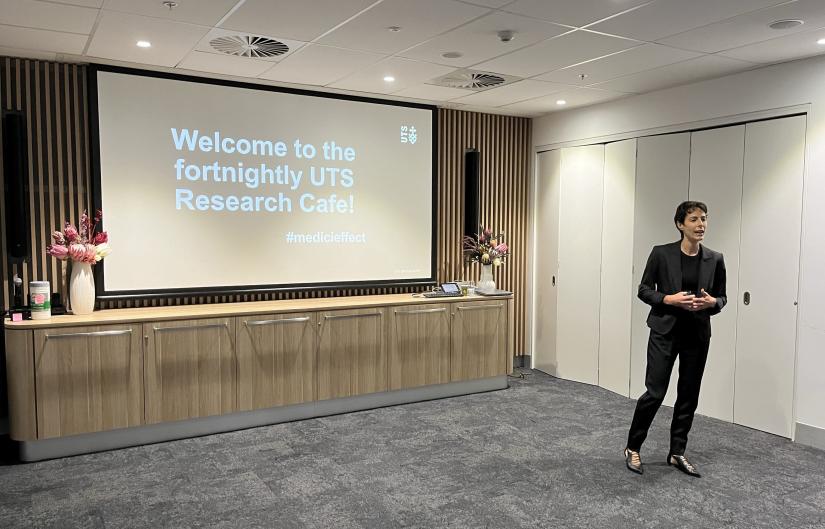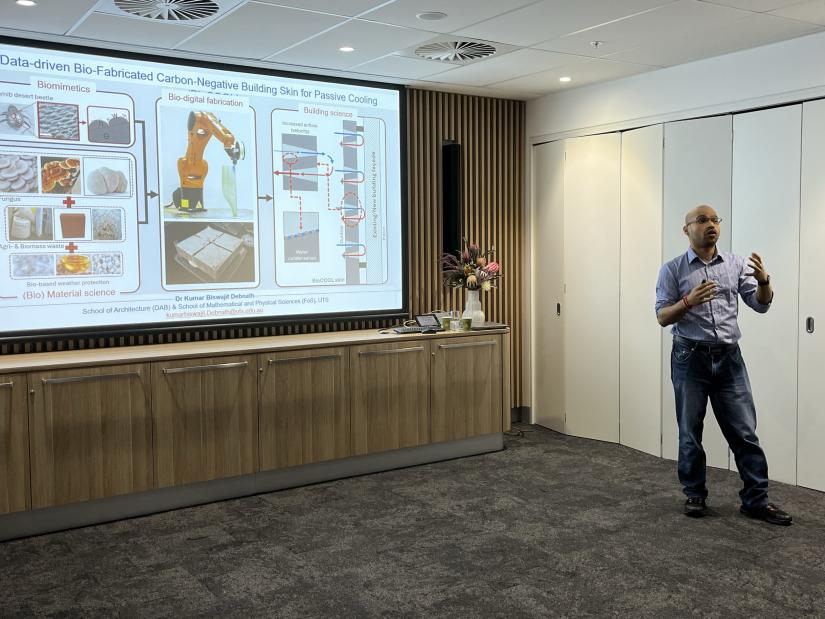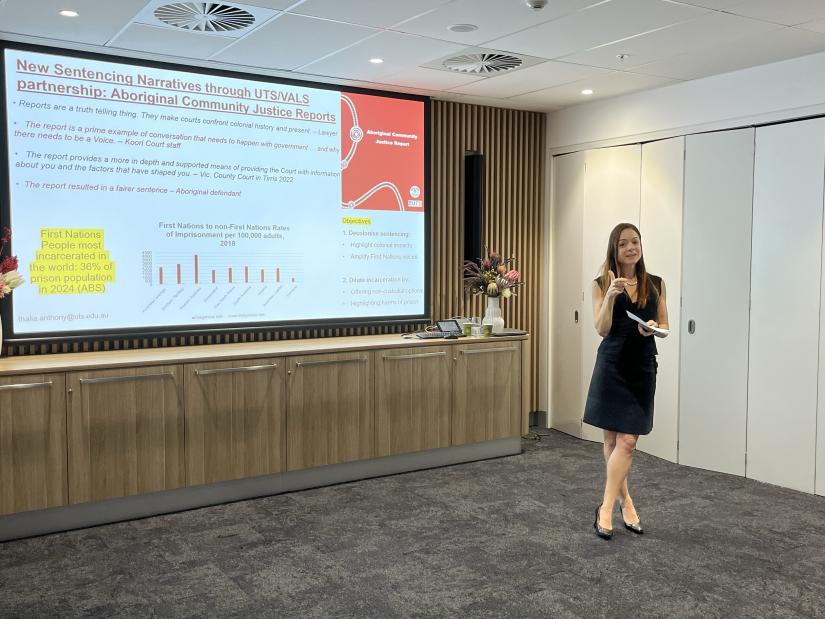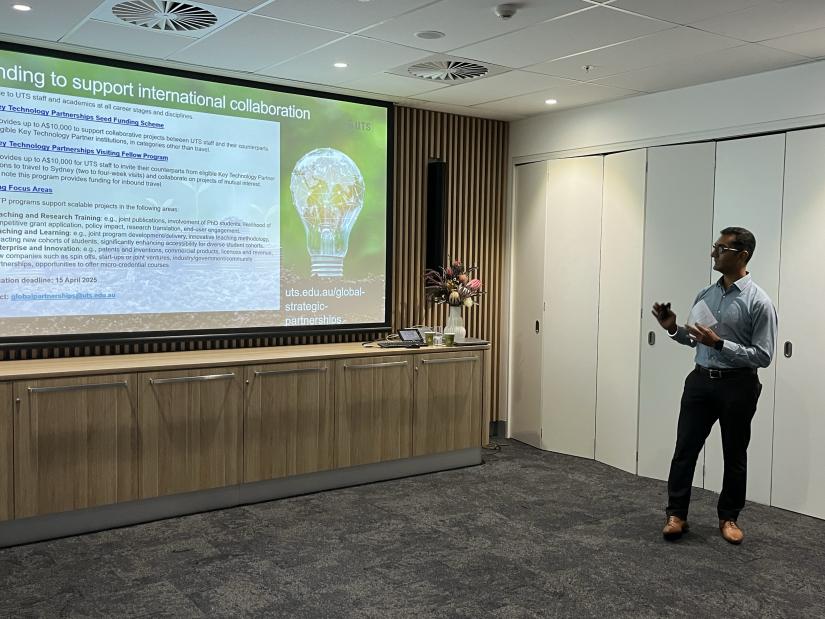In our first Research Cafe for the year, our speakers discussed pioneering sustainable building materials, reducing mass incarceration for Indigenous defendants and Key Technology Partnerships funding.
Forging connections at the Research Cafe

Caption
Associate Dean of Research at the UTS TD School Associate Professor Fanny Salignac speaking at Research Cafe
Associate Dean of Research at the UTS TD School Associate Professor Fanny Salignac began the session by introducing the purpose of Research Cafe and the importance of collaboration and networking.
“The intention of Research Cafe is to have a space for all of us across the university to connect, come out of silos, disciplines and research areas and be able to talk to each other and see all the great things that we can work on together,” she said.
“We’re facing complex issues in the world today. To address those issues, we need to collaborate, because we all have different strengths and expertise to actually bring to address those issues.”
We really need to work together to address the complexity of all those root causes. There's a lot that we don't know, but together, we're stronger, and we need to work all together across those disciplinary boundaries.
“All of you are doing work that is interconnected, and we can learn from each other. And those complex issues out there cannot be solved by just one discipline,” Fanny said.
“We really need to work together to address the complexity of all those root causes. There's a lot that we don't know, but together, we're stronger, and we need to work all together across those disciplinary boundaries.”
Transforming waste into biomaterials

Our first speaker, Dr Kumar Biswajit Debnath, introduced his project creating a building skin that cools down buildings using biomaterials.
“I want you to imagine a building skin, or exterior building wall, that cools down the building in this warming world without any energy,” he said. “And at the end of the lifecycle, you can throw that building material into the compost, and it will completely biodegrade. That's the objective of this project.”
As a Chancellor's Research Fellow at the School of Architecture, Kumar is transforming the future of construction through pioneering interdisciplinary approaches to sustainable building materials. By upcycling organic waste and utilising innovative mycelium-based composites, he is creating climate-resilient, biomimetic building skins that address the challenges of a warming world.
I want you to imagine a building skin, or exterior building wall, that cools down the building in this warming world without any energy. And at the end of the lifecycle, you can throw that building material into the compost, and it will completely biodegrade.
Kumar has been using biomass waste from agriculture, sugar mill factories, breweries and wood and turning them into mycelium-based biomaterial.
“We are using biomimetics from a beetle in the Namib Desert which can extract water from air,” he said. “We are trying to mimic those characteristics into the skin when we are growing it.”
The process also involves bio-digital fabrication, where the fungus is fabricating at the same time to contribute to the fabrication of the skin that will extract water from air.
“The incoming air is going to cool down and it will be 100% particle. That's the optimum,” Kumar said.
Changing the narrative

Professor Thalia Anthony from the Faculty of Law studies the impacts of mass incarceration on Indigenous people. She has discovered new ways to change the narrative in criminal sentencing through Aboriginal Community Justice Reports. Her participatory action research in Victorian courts has reduced incarceration for Indigenous defendants.
Thalia spoke about her project with the Victorian Aboriginal Legal Service to address the problem of mass incarceration.
“We have the most incarcerated people in the world when it comes to Indigenous people - more incarcerated than African American people in the United States,” she said.
Thalia spoke about the 1991 Royal Commission into Aboriginal deaths in custody that found an injustice in the numbers of Aboriginal people locked up at the time, constituting 14% of the population. Today, the number has risen to 36%.
She spoke of the difficulty in disrupting this trend as there is overrepresentation in all states and territories.
It's a small way research can make a difference, but I think our hope is from little things, big things grow. We change cultures in court, we humanise Aboriginal people, and we push back on this systemic racism that is driving incarceration.
“What we've tried to do in Victoria is change the narrative in sentencing,” Thalia said, adding that more judges are sentencing people to prison rather than keeping them in the community.
“What we've attempted to do is introduce reports that provide options for the court that are safe, that are in community and that harness culture.”
“We give the background of the Aboriginal person and ask the court to look at the strengths of culture and look at that as a protective factor to keep them safe in the community, with connection to programs, elders and other place-based strengths.”
Thalia and those involved have been able to reduce the prison sentences that have been handed down for people who have a report. As a result of this intervention, many people have been able to stay in the community and with family and children.
Thalia interviewed stakeholders as part of participatory research as she both enacted the report and oversaw and evaluated the implementation as part of an Australian Research Council Linkage Project.
Remote video URL
“I interviewed lawyers who referred to the reports as truth-telling, because the courts must confront the colonisation that has affected the individual. We make very direct links between how systemic racism has got this person to the court has got this person to this trajectory of anti-social behaviour,” she said.
“We also interviewed staff. Some of them talked about these reports being a conversation, almost like a mini form of treaty, where the courts must make an agreement with the elders and with the community.”
Thalia said there has been several published court decisions that speak to how important these reports are in giving depth to understanding the individual and what they need outside of prison.
“Overall, Aboriginal people who have had their reports tabled have felt completely empowered by the process of being able to tell their story in court,” Thalia said. “Very rarely do people who are being sentenced have a voice. They very rarely say anything. They're usually being funnelled through their lawyers, and often even their lawyers don't have time with them to collect their story.”
“It this unique place for Aboriginal people to tell their story on their terms and to be humanised in front of the judge or magistrate.”
“It's a small way research can make a difference, but I think our hope is from little things, big things grow. We change cultures in court, we humanise Aboriginal people, and we push back on this systemic racism that is driving incarceration,” Thalia said.
Key Technology Partnerships

Engagement Manager with the UTS Global Partnerships team in the International Unit, Kumar Jain, then spoke about exciting funding opportunities with Key Technology Partnerships.
The program is open to all UTS staff, academics and professional staff, with five Key Technology partners being Indian Institute of Technology Madras in India, the Pontifical Catholic University of Chile, Shanghai University in China, Technical University of Berlin in Europe and University of Arizona in America.
Kumar said there are two different funding programs.
“One is the seed funding scheme, which is basically an online collaboration, which does not include travel. But there are other types of activities that you can participate in like joint virtual events, data collection and development of core subjects.”
“The second funding program is the Visiting Fellow Program in which UTS staff can invite the counterparts from these five eligible Key Technology Partners on campus and host them for two to four weeks.”
Funding focus areas include research and research training, teaching and learning and enterprise and innovation.
Applications are now open and close on 15th of April.
Learn more about Key Technology Partnerships or contact Global Partnerships via email for more information.
Learn more about Research Cafe and how to receive the Calendar invitation.